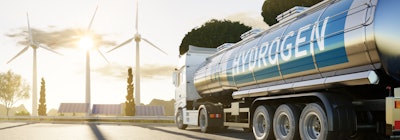
The World Benchmarking Alliance’s new Transport Benchmark highlights an urgent need for the transportation sector to develop and scale sustainable alternatives to fossil fuels.
Conducted in partnership with CDP, the research shows that transport has the highest reliance on fossil fuels of all sectors, with more than 90% of transport energy coming from crude oil-derived products. Despite this, only 7% of companies assessed have committed to phasing out their use of fossil fuels. Across all companies, 85% have fleets incompatible with a low-carbon future but the majority fail to disclose any plans for changing this.
“Transport accounts for 37% of global carbon emissions, so the sector has to step up if we are to keep 1.5 alive. The large-scale change needed cannot be achieved without every company getting actively involved across their business – from research to customer advice to support for low-carbon policies and regulation. There is an urgent need for collaboration to identify and scale solutions,” says Vicky Sins, World Benchmarking Alliance’s decarbonization and energy transformation lead. “Transport companies are vital to connecting people and goods globally, but they cannot thrive unless the places and people around them are thriving too. It is no exaggeration to say the future of our world will be significantly shaped by how these companies translate pledges into action.”
From World Benchmarking Alliance:
- Some of the solutions that transport operators need to adopt, such as alternative fuels and cleaner vehicles are still in early development and analysis showed that on average only 0.3% of total transport-related revenues are invested in research and development into low-carbon technologies and fuels, such as electric vehicles and sustainable aviation fuels.
- Investment in R&D is critical to ensuring that new technologies can come to market more quickly, as is working in partnership with suppliers and developers such as vehicle manufacturers or fuel producers. However, 94% of companies do not provide any meaningful data on research and development into low-carbon vehicles and fuels.
- Only three companies out of 90 showed any significant support for low-carbon policy and just six directly work with infrastructure operators to build low-carbon solutions. Meanwhile, 48% of the benchmarked companies have a strategy to help customers to reduce emissions but none of the companies had set measurable targets for customer engagement to encourage low-carbon alternatives.
- Altogether, the 90 transport companies surveyed employ an estimated total of 9.6 million people around the world but only 43% of these have a publicly available policy statement committing to respect the health and safety of their workers.
















![Pros To Know 2026 [color]](https://img.sdcexec.com/mindful/acbm/workspaces/default/uploads/2025/08/prostoknow-2026-color.mduFvhpgMk.png?ar=16%3A9&auto=format%2Ccompress&bg=fff&fill-color=fff&fit=fill&h=135&q=70&w=240)

